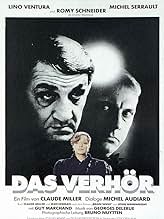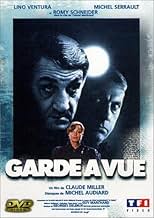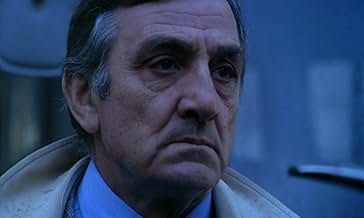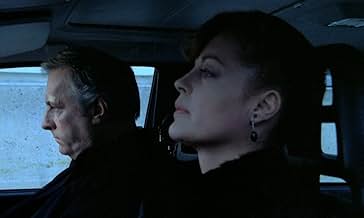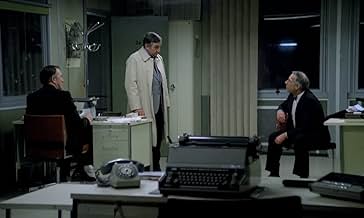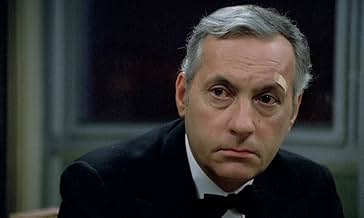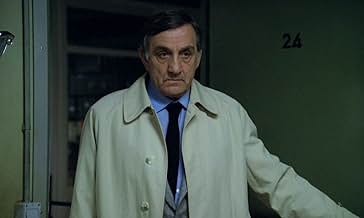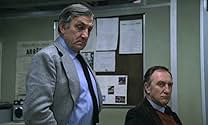Garde à vue
- 1981
- 1h 27m
ÉVALUATION IMDb
7,6/10
5,9 k
MA NOTE
Ajouter une intrigue dans votre langueA police inspector, suspecting an attorney of two child sex murders, has him held for a questioning session that goes on for hours.A police inspector, suspecting an attorney of two child sex murders, has him held for a questioning session that goes on for hours.A police inspector, suspecting an attorney of two child sex murders, has him held for a questioning session that goes on for hours.
- Prix
- 6 victoires et 5 nominations au total
Mohammed Bekireche
- Arab
- (uncredited)
Claude Carliez
- Un policier
- (uncredited)
Avis en vedette
A masterpiece.
Every line and every scene.
The opposite of Hollywood, a lifelike movie.
Simple, complex and authentic.
All actors are legends of cinema. Well, those movies are things of the past. A true gem that most will not understand anymore.
Fine piece of a psychological approaching over the veteran police Inspector Gallien (Lino Ventura) and the suspect Jerome Martinaud (Michael Serrault) of two murders and rapes of two young girls, under pleasure by the skilled Gallien who impose an strategic guideline to extract a confession, in other hand the smart Jerome an old man with a failed marriage has to answer the several double meaning questions, the cold and stiffing atmosphere on the room at the police precinct is extremely grueling for both and more to the viewers neither, even having break a couple times in between when it's back starts all over again, until a key witness appears, Jerome's wife, Chantal Martinaud (Romy Schneider, how was beauty yet) the accused refuses meeting her, then Gallien has a private conversation on a separate room, after a long talk at last the convinced Inspector has a card hidden on his sleeve, even never hearing nothing over the Director Claude Miller, he made a fabulous and complex picture, when you suppose that all are settled, then goes a crowning surprise, according my feelings both Lino Ventura and Jean Gabin were the greatest French actors of all times and this picture states that, also Serrault deserves my greetings for such performance!!!!
Resume:
First watch: 2019 / How many: 1 / Source: DVD/ Rating: 8.75
Resume:
First watch: 2019 / How many: 1 / Source: DVD/ Rating: 8.75
At the beginning of this movie, while credit titles are still running, you are immersed in an atmosphere that mix your feelings, with dark winter night, clapping rain on windows and a marvelous music (composed by Georges Delerue) which evoke merry-go-round, barrel organ and festive childhood.
And then the music stops and you enter in an austere police office for a questioning on the murder of two children.
No show off. No special effects. Dialogue.
And you discover how sad and lonesome adults can be sometimes in their games or duties.
Excellent movie.
And then the music stops and you enter in an austere police office for a questioning on the murder of two children.
No show off. No special effects. Dialogue.
And you discover how sad and lonesome adults can be sometimes in their games or duties.
Excellent movie.
Inspector Antoine Gallien (Lino Ventura) is a no non-sense and practical man who only believes in facts and evidence, and is assigned on the New Year 's Eve to question a wealthy tuxedo-wearing attorney named Jerôme Martinaud (Michel Serrault), suspected for the rape and murder of two little girls. There's no real evidence against him except that he was near the locations where the victims were found. So, because he was at the wrong places, at the wrong moments, he naturally falls "under suspicion" (a wink to the US remake's title).
"Garde à Vue" has only four main characters, the two leads plus Gallien's colorful assistant Marcel Belmont (Guy Marchand) and Martinaud's cold and sophisticated wife (Romy Schneider in her next to last role). And through a short running-time of eighty something minutes and a very austere setting such as the commissariat of a French small town, the whole movie consists on a long questioning session where Gallien tries to establish Martinaud's alibi, if he ever has one. Needless to say that both actors are perfect: Ventura plays the determined and competent cop with a bluffing realism, and Serrault's nervousness and confusion, powerful convey the idea of a man who's not acting natural. It takes some super-human acting strength to naturally play a non-natural character. As the session progresses, it becomes obvious that Martinaud can't afford an alibi, yet it's also obvious that Gallien doesn't want to be misguided by this obviousness.
And in fact, even the film seems to be governed by a sort of deliberately misguiding impression, as if it was manipulating us like Martinaud seems to manipulate his audience. Indeed, "Garde à Vue" strikes by an astonishing minimalism: It's a film of a few words, a few scenes, a few actors, but each of these elements is perfect and doesn't ask for more. Directed by Claude Miller and written by one of the greatest French screenwriters, Michel Audiard, "Garde à Vue" is a film that meticulously concentrates all the elements of greatness that make the best cop/thrillers and elevate it to another dimension. More than a cop/thriller, "Garde à Vue" is a remarkable character study where the flaws of its main character are highlighted by a confrontation with a totally opposite personality. We look at Martinaud from Gallien's perspective, then from his wife's, and we try to find out by ourselves not if he's guilty or not guilty but what kind of man, he really is.
Like another minimalist masterpiece, "12 Angry Men", "Garde à Vue" is an intelligent introspection into the way human personalities from different backgrounds can interact in their quest for facts and truths. How intelligence and the conscience of one's own failure and mediocrity can work as a mask to disguise emotions. And the film is full of them, the questioning starts in a very polite way. Progressively, Martinaud expresses his displeasure to be taken in an interrogation room while everyone celebrates the New Year's Eve. But he's incapable of providing an alibi, and therefore slips into the suspect n°1 category. Belmont believes he's guilty and tries to get the confession the easy way, by slapping Martinaud around when Gallien is absent. But it doesn't work, Martinaud oscillates between a state where he asserts his rights and others where he falls in his miserable condition, convinced that he's only accused by people because they're as mediocre as him and can't stand the idea of a mediocre man succeeding.
And 'mediocre' is an epithet that fits Martinaud, thanks to Serrault's magnificent capability to play ambiguous and double-faced characters. He masterfully embodies this category of men, apparently successful and wealthy but living a totally miserable life, they're by essence misleading persons, because their very lives give the wrong impression. The film embarks us in a succession of facts and sordid details about Martinaud's marital life incarnated by a long corridor between him and his wife, it's not infidelity, not impotence, but it's pure nothingness. Martinaud's sexual tendencies, pointing a more and more accusing finger, are the reasons behind the failure of his marriage, but Gallien still can't see where this is leading. He feels he's being manipulated by emotions, not realizing that these emotions can give serious clues about Martinaud's eventual motives. But he's afraid of having wrong impressions and desperately asks for an alibi and a confession. But how can you ask such a clear question to a man so full of contradictions. In a way, Gallien is manipulated by his own fear of being manipulated.
That's the masterstroke of Michel Audiard, the film doesn't let itself embark by obviousness, there are facts, there are motives, there are proof but human relationships predominate above all these considerations. And even a practical man like Gallien can get the wrong impression, even from facts.. The writing and the editing, swinging back and forth between the interrogation, the crime settings and Martinaud's background create the enthralling feeling of a puzzle whose pieces reassemble. But it's the kind of puzzle that you only know the picture after reassembling them, you can't have a clear idea even when you come close to the heart-pounding conclusion. And the acting and directing contribute to a very realistic feel. The interrogation room is not too threatening, there's not a suffocating atmosphere aggravated by a terrorizing inspector. No, Gallien is relatively calm and tolerates Martinaud's outbursts with an impressive patience. Everything is handled as humanly as possible.
The film won four deserved César (French Oscars) for Best Actor (Serrault), Best Supporting Actor (Marchand), Best Editing and Best Writing. I was surprised to see that Lino Ventura wasn't nominated because his performance made of calm and quiet strength was not only spectacular in its nuance but indispensable not to let the film become caricatural. Never mind, every single element works perfectly and it's one of the greatest French thrillers.
"Garde à Vue" has only four main characters, the two leads plus Gallien's colorful assistant Marcel Belmont (Guy Marchand) and Martinaud's cold and sophisticated wife (Romy Schneider in her next to last role). And through a short running-time of eighty something minutes and a very austere setting such as the commissariat of a French small town, the whole movie consists on a long questioning session where Gallien tries to establish Martinaud's alibi, if he ever has one. Needless to say that both actors are perfect: Ventura plays the determined and competent cop with a bluffing realism, and Serrault's nervousness and confusion, powerful convey the idea of a man who's not acting natural. It takes some super-human acting strength to naturally play a non-natural character. As the session progresses, it becomes obvious that Martinaud can't afford an alibi, yet it's also obvious that Gallien doesn't want to be misguided by this obviousness.
And in fact, even the film seems to be governed by a sort of deliberately misguiding impression, as if it was manipulating us like Martinaud seems to manipulate his audience. Indeed, "Garde à Vue" strikes by an astonishing minimalism: It's a film of a few words, a few scenes, a few actors, but each of these elements is perfect and doesn't ask for more. Directed by Claude Miller and written by one of the greatest French screenwriters, Michel Audiard, "Garde à Vue" is a film that meticulously concentrates all the elements of greatness that make the best cop/thrillers and elevate it to another dimension. More than a cop/thriller, "Garde à Vue" is a remarkable character study where the flaws of its main character are highlighted by a confrontation with a totally opposite personality. We look at Martinaud from Gallien's perspective, then from his wife's, and we try to find out by ourselves not if he's guilty or not guilty but what kind of man, he really is.
Like another minimalist masterpiece, "12 Angry Men", "Garde à Vue" is an intelligent introspection into the way human personalities from different backgrounds can interact in their quest for facts and truths. How intelligence and the conscience of one's own failure and mediocrity can work as a mask to disguise emotions. And the film is full of them, the questioning starts in a very polite way. Progressively, Martinaud expresses his displeasure to be taken in an interrogation room while everyone celebrates the New Year's Eve. But he's incapable of providing an alibi, and therefore slips into the suspect n°1 category. Belmont believes he's guilty and tries to get the confession the easy way, by slapping Martinaud around when Gallien is absent. But it doesn't work, Martinaud oscillates between a state where he asserts his rights and others where he falls in his miserable condition, convinced that he's only accused by people because they're as mediocre as him and can't stand the idea of a mediocre man succeeding.
And 'mediocre' is an epithet that fits Martinaud, thanks to Serrault's magnificent capability to play ambiguous and double-faced characters. He masterfully embodies this category of men, apparently successful and wealthy but living a totally miserable life, they're by essence misleading persons, because their very lives give the wrong impression. The film embarks us in a succession of facts and sordid details about Martinaud's marital life incarnated by a long corridor between him and his wife, it's not infidelity, not impotence, but it's pure nothingness. Martinaud's sexual tendencies, pointing a more and more accusing finger, are the reasons behind the failure of his marriage, but Gallien still can't see where this is leading. He feels he's being manipulated by emotions, not realizing that these emotions can give serious clues about Martinaud's eventual motives. But he's afraid of having wrong impressions and desperately asks for an alibi and a confession. But how can you ask such a clear question to a man so full of contradictions. In a way, Gallien is manipulated by his own fear of being manipulated.
That's the masterstroke of Michel Audiard, the film doesn't let itself embark by obviousness, there are facts, there are motives, there are proof but human relationships predominate above all these considerations. And even a practical man like Gallien can get the wrong impression, even from facts.. The writing and the editing, swinging back and forth between the interrogation, the crime settings and Martinaud's background create the enthralling feeling of a puzzle whose pieces reassemble. But it's the kind of puzzle that you only know the picture after reassembling them, you can't have a clear idea even when you come close to the heart-pounding conclusion. And the acting and directing contribute to a very realistic feel. The interrogation room is not too threatening, there's not a suffocating atmosphere aggravated by a terrorizing inspector. No, Gallien is relatively calm and tolerates Martinaud's outbursts with an impressive patience. Everything is handled as humanly as possible.
The film won four deserved César (French Oscars) for Best Actor (Serrault), Best Supporting Actor (Marchand), Best Editing and Best Writing. I was surprised to see that Lino Ventura wasn't nominated because his performance made of calm and quiet strength was not only spectacular in its nuance but indispensable not to let the film become caricatural. Never mind, every single element works perfectly and it's one of the greatest French thrillers.
The genre known as the 'police procedural' has been around since Wilkie Collins in the late nineteenth century and has reached the heights cinematically with Clouzot's 'Quai des Orfevres' and the 'High and Low' of Kurosawa.
We owe a debt of thanks to brilliant screen writer Michel Audiard, himself no stranger to this type of material, for spotting the potential of John Wainwright's novel 'Brainwash' from 1979. Audiard also contributes dialogue to this adaptation, thereby ensuring that the characters have plenty to say!
Wainwright, a private and taciturn Yorkshireman who described himself as a 'teller of tales and nothing more', is, alas, pretty well forgotten now. He acknowledged his admiration for Ed McBain's '87th Precinct' series whilst the authenticity of the interrogation methods in his books stems from his having been a policeman for over twenty years!
One of the many joys of French cinema is its emphasis on character rather than plot and here Claude Miller has the golden opportunity of directing his four main protagonists in a confined space. The darkness outside and the rain lashing at the windows merely serve to heighten the tensions.
Needless to say, a film like this only works if one is absorbed by the characters. How could one fail to be when these are played by Lino Ventura and Guy Marchand as 'good' cop and 'bad' cop respectively, Michel Serrault as the suspect and Romy Schneider as his wife?
This is film acting of the highest quality in which the psychological penetration and ever-changing dynamics are utterly riveting. Serrault deservedly picked up a César for his portrayal. He has the showier role of course whilst the customary 'little is good, less is better' performance by Ventura is mesmerising. Guy Marchand's depiction of 'brawn over brain' is effective. Romy Schneider once again tugs at the heart strings. Her death the following year and the deep sadness that preceded it, makes her performance, in retrospect, even more touching.
The ending, for some, is a little too 'convenient' but is no less powerful for that.
The critical and commercial success of this piece gave Claude Miller a much-needed boost as his directorial career had been in the doldrums.
Twenty years were to elapse before Hollywood filmed the obligatory remake. The result wasn't worth the wait!
We owe a debt of thanks to brilliant screen writer Michel Audiard, himself no stranger to this type of material, for spotting the potential of John Wainwright's novel 'Brainwash' from 1979. Audiard also contributes dialogue to this adaptation, thereby ensuring that the characters have plenty to say!
Wainwright, a private and taciturn Yorkshireman who described himself as a 'teller of tales and nothing more', is, alas, pretty well forgotten now. He acknowledged his admiration for Ed McBain's '87th Precinct' series whilst the authenticity of the interrogation methods in his books stems from his having been a policeman for over twenty years!
One of the many joys of French cinema is its emphasis on character rather than plot and here Claude Miller has the golden opportunity of directing his four main protagonists in a confined space. The darkness outside and the rain lashing at the windows merely serve to heighten the tensions.
Needless to say, a film like this only works if one is absorbed by the characters. How could one fail to be when these are played by Lino Ventura and Guy Marchand as 'good' cop and 'bad' cop respectively, Michel Serrault as the suspect and Romy Schneider as his wife?
This is film acting of the highest quality in which the psychological penetration and ever-changing dynamics are utterly riveting. Serrault deservedly picked up a César for his portrayal. He has the showier role of course whilst the customary 'little is good, less is better' performance by Ventura is mesmerising. Guy Marchand's depiction of 'brawn over brain' is effective. Romy Schneider once again tugs at the heart strings. Her death the following year and the deep sadness that preceded it, makes her performance, in retrospect, even more touching.
The ending, for some, is a little too 'convenient' but is no less powerful for that.
The critical and commercial success of this piece gave Claude Miller a much-needed boost as his directorial career had been in the doldrums.
Twenty years were to elapse before Hollywood filmed the obligatory remake. The result wasn't worth the wait!
Le saviez-vous
- AnecdotesEntirely shot in studio (with the exception of one sequence in a hotel) and in chronological order.
- ConnexionsFeatured in Un jour, un destin: Lino Ventura, les combats d'une vie (2011)
- Bandes originalesChantal Martineau
Written and Performed by Georges Delerue Et Son Orchestre
Meilleurs choix
Connectez-vous pour évaluer et surveiller les recommandations personnalisées
- How long is The Grilling?Propulsé par Alexa
Détails
- Date de sortie
- Pays d’origine
- Langue
- Aussi connu sous le nom de
- The Inquisitor
- Lieux de tournage
- Préfecture des Yvelines - 11 Avenue de Paris, Versailles, Yvelines, France(police station courtyard)
- sociétés de production
- Consultez plus de crédits d'entreprise sur IMDbPro
Contribuer à cette page
Suggérer une modification ou ajouter du contenu manquant

